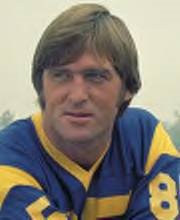
Several years ago, a group called Depeche Mode released a techno/goth dance club anthem entitled, "Your Own Personal Jesus," which has since been recorded by the diverse likes of Marilyn Manson and Johnny Cash. Just as each of these artists has approached the song from a different perspective which reflects his "own personal Jesus," so it seems that our culture today desires to make God in our own preferred image rather than submitting ourselves to the God who created us in His image. Consider Dan Brown and The DaVinci Code, or the popularity of the “Gospel of Judas” and other Gnostic writings. Yet one does not have to drift far outside of evangelical circles to find “Personal Jesi” of various types. It seems that many have employed the idol-making factories of their imaginations by manufacturing an American Jesus. Drop into many American mega-churches and country chapels alike on any patriotic holiday weekend, and you will hear the gospel of this Jesus proclaimed.
In a New Yorker review of the book entitled American Jesus by Stephen Prothero, the reviewer writes that Jesus has "has slipped the bonds of Christianity altogether to become icon and brand, as American as Mickey Mouse or the Coca-Cola bottle." The title of Prothero's book may or may not find its origin in the song by the same title recorded by a group known as Bad Religion.
The lyrics of the song describe this "American Jesus":
I don't need to be a global citizen,
'Cuz I'm blessed by nationality,
I'm a member of a growing populace,
we enforced our popularity
there are things that seem to pull us under and
and there are things that drag us down,
but there's a power and a vital presence
that's lurking all around
we've got the American Jesus
see him on the interstate,
we've got the American Jesus
he helped build the president's estate
I feel sorry for the earth's population
'cuz so few live in the U.S.A,
at least the foreigners can copy our morality,
they can visit but they cannot stay,
only precious few can garner the prosperity,
and it makes us walk with confidence,
we've got a place to go when we die
and the architect resides right here
we've got the American Jesus
bolstering national plan
we've got the American Jesus
overwhelming millions everyday
he's the farmer barren fields,
the force the army wields,
the expressions in the faces
of the starving millions,
the power of the man.
the fuel that drives the clan,
the motive and the conscience
of the murderer
he's the preacher on TV,
the false sincerity,
the form letter that written by
the big computers,
he's the nuclear bombs,
and the kids with no moms
and I'm fearful that
he's inside me.
We've got the American Jesus
see him on the interstate
We've got the American Jesus
exercising his authority
We've got the American Jesus
bolstering national plan
We've got the American Jesus
overwhelming millions everyday, Yeah!
One nation under God
While I certainly do not want to endorse the worldview of this group or their songs, I do think they have accurately described what many people see of Christianity in
Indeed, if this American Jesus is the one living inside of you, then there is much to fear, but He is not the biblical Jesus with real saving power. When we talk about God, we must realize that we do not have the authority to invent Him in a way that is pleasing or appealing to our own depraved desires. When God revealed Himself to Moses, He said, "I am who I am." That means, as Francis Schaeffer indicated, that we must deal, not with the God we might wish to invent, but with "The God Who is There." This is the God who incarnated Himself in Jesus Christ.
When we take a pseudo-Jesus and wrap him in the American flag to suggest that
So, the call today is for us to exchange this bad religion of the American Jesus for the true faith of the biblical Gospel which calls all peoples of the earth, even Americans, to repentance of all pride, all arrogance and prejudices and every other self-centered sin so that the Genuine Jesus might be enthroned in our hearts as Lord. And then through us, this Genuine Jesus might demonstrate His power by using our lives to bring glory to Himself among all nations.
American Christians, I want to ask you to do as the Apostle Paul said in 2 Corinthians 13:5 and examine yourselves. Examine the Jesus that is living inside of you. Is He the biblical Jesus who has a heart for all nations to worship Him, or is he the American Jesus whose blood flowed red, white, and blue for all those who live within our own boundaries. Pastors and teachers, examine your calling. God has not called us to advance a neo-Gospel of democracy or westernization. He has called us to proclaim the one true Gospel which is offered to all nations for salvation from sin. And non-Christians, please do not evaluate the Christian faith based on the “American Jesus” whom you often see portrayed and hear proclaimed. The genuine Jesus died for the sins of the world, including your own.



















